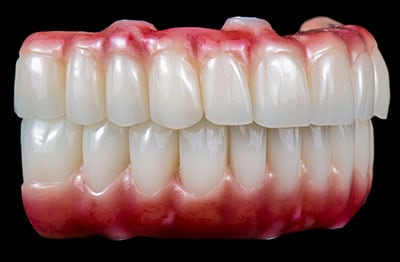
What Are Dental Implants?
Dental implants are often the best treatment for missing teeth. When a damaged or decayed tooth is removed, both the visible part of the tooth, called the crown, and the part of the tooth underneath the gums, the root, are lost. A dental implant is placed in the jawbone to fuse with your natural bone and become a solid and sturdy foundation for replacement teeth. Implants can replace an individual tooth with an implant-supported bridge or denture containing multiple teeth. Dental implants are the closest you can get to healthy, natural teeth. They will allow you to confidently eat, smile, laugh, talk, play and enjoy all your everyday activities without thinking about your teeth.
Benefits:
- Safeguards your natural bone integrity
- Long term solution, immune to cavities
- Spares neighboring teeth from grinding
- Unmatched as the top tooth replacement option
- Boasts both aesthetic appeal and natural functionality
Challenges:
- Requires patience to allow for the implant’s full integration
How Do Dental Implants Work?
Teeth restored with dental implants look, feel, and function like natural teeth. You brush, floss, and visit your dentist for regular check-ups and cleanings, just as you would to care for a natural tooth.
After consulting with a dental implant dentist to develop your treatment plan, the placement of a dental implant typically involves several steps: A cylindrical and tapered post, usually made of titanium, is surgically placed into the jawbone.
As you heal, your implant will osseointegrate, or fuse with, your natural jawbone, forming a strong and long-lasting foundation for your replacement teeth. This healing process can take weeks to months, during which you can continue with your everyday life between appointments.
Once the implant bonds with the jawbone, a small connector – called an abutment – is placed on top of the dental implant to connect it to the replacement tooth or teeth. An individual tooth, an implant-supported bridge, or dentures containing multiple teeth are then attached to the abutment.

How Do I Care For My Dental Implants?
Caring for teeth restored with dental implants is akin to caring for your natural teeth: brush, floss, and maintain regular dental cleanings and check-ups as scheduled. Additional cleaning aids may also be recommended to help you maintain optimal oral health at home. As with natural teeth, you and your dentist must collaborate to ensure the llongevity of your dental implant. While replacement teeth are not susceptible to cavities, they are subject to the same wear-and-tear as natural teeth. Well-placed and properly cared for dental implants have the potential to last a lifetime.

Why Are Dental Implants Preferred Over Other Options For Tooth Restoration?
- As close to healthy, natural teeth as it gets. A dental implant offers unparalleled strength and stability, seamlessly restoring a lost tooth to match a natural tooth’s look, feel, fit, and function. Unlike alternative options, dental implants prevent bone deterioration and avoid potential disruptions to everyday activities like eating, smiling, and speaking. Image to Include
- Engineered for longevity, dental implants provide a lasting solution. Dental implants offer a potential lifetime solution, unlike traditional tooth-supported bridges, which typically last five to seven years and may require replacement. Dental implants can endure indefinitely with proper placement and care, providing lasting stability and functionality.
- Embrace life without the burden of dental concerns! Say goodbye to staying home or feeling self-conscious in public due to a different smile. Forget worrying about missing teeth hindering your ability to enjoy life’s pleasures or the discomfort of removable dentures. Dental implants restore your confidence, allowing you to lead life on your terms without limitations or worries about your teeth holding you back.
- Preserve your natural facial contours and smile confidently. A toothless face can appear sunken and aged, but dental implants help maintain your natural shape and smile, ensuring a youthful and vibrant appearance. Image To Add
- Safeguard your bone health. Empty spaces in your mouth post-tooth loss can trigger further complications, including jawbone loss and deterioration. Without the support of a natural tooth, the jawbone weakens over time. Dental implants are the sole restoration method that conserves and stimulates natural bone, promoting bone growth and averting bone loss.
- Speak effortlessly. Transitioning to removable dentures can involve difficulty pronouncing everyday words. However, dental implants function like natural teeth, ensuring smooth and easy speech.
- Indulge in your favorite foods! With dental implants, savor the taste and delight of your preferred dishes without hesitation. Enjoy biting naturally and relish virtually any food you desire. Unlike uncomfortable removable dentures, dental implants allow you to experience your meals’ taste and texture fully.
- Say goodbye to cavities! Dental implants eliminate the risk of cavities in restored crowns or replacement teeth. Nonetheless, regular dental visits and daily cleaning and care for your gums and mouth are essential, just as you would for a natural tooth.
- Preserve your healthy teeth. Unlike tooth-supported bridges, which necessitate grinding healthy teeth adjacent to the missing tooth or teeth, dental implants are inserted directly into the jawbone at the site of the missing tooth root. This process avoids any impact on healthy teeth and helps prevent adjacent teeth from shifting, as can occur with prolonged empty spaces. Image to Include
- Highly reliable and predictable. Dental implant treatment boasts a track record of consistent, long-term successful outcomes, making it a preferred choice over other methods for repairing or replacing missing teeth. Dental implants offer a more predictable solution than bridgework, removable appliances, and retreatment of failing root canal therapy.
Information used with permission from the AAID (American Academy of Implant Dentistry)
Discover The Transformative Power of Implant Dentistry Now!
Experience the transformation with our advanced dental implant surgery. Schedule your consultation today for personalized treatment from Dr. Erik Solberg; Board Certified by the American Board of Oral Implantology. Contact us at (612) 601-0050 for more information.
Copyright © 2025 Rise Dental Implants – All Rights Reserved.
Risedentalimplants
Hi! Let us know how we can help and we’ll respond shortly.
This site is protected by reCAPTCHA and the Google Privacy Policy and Terms of Service apply.
